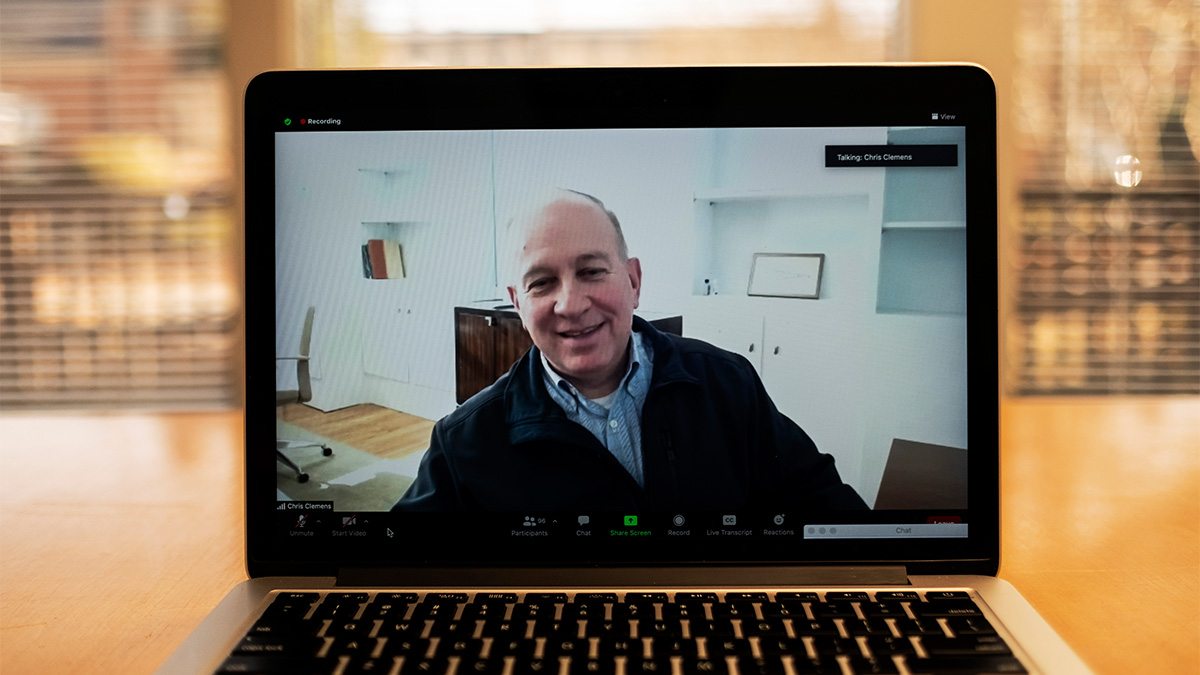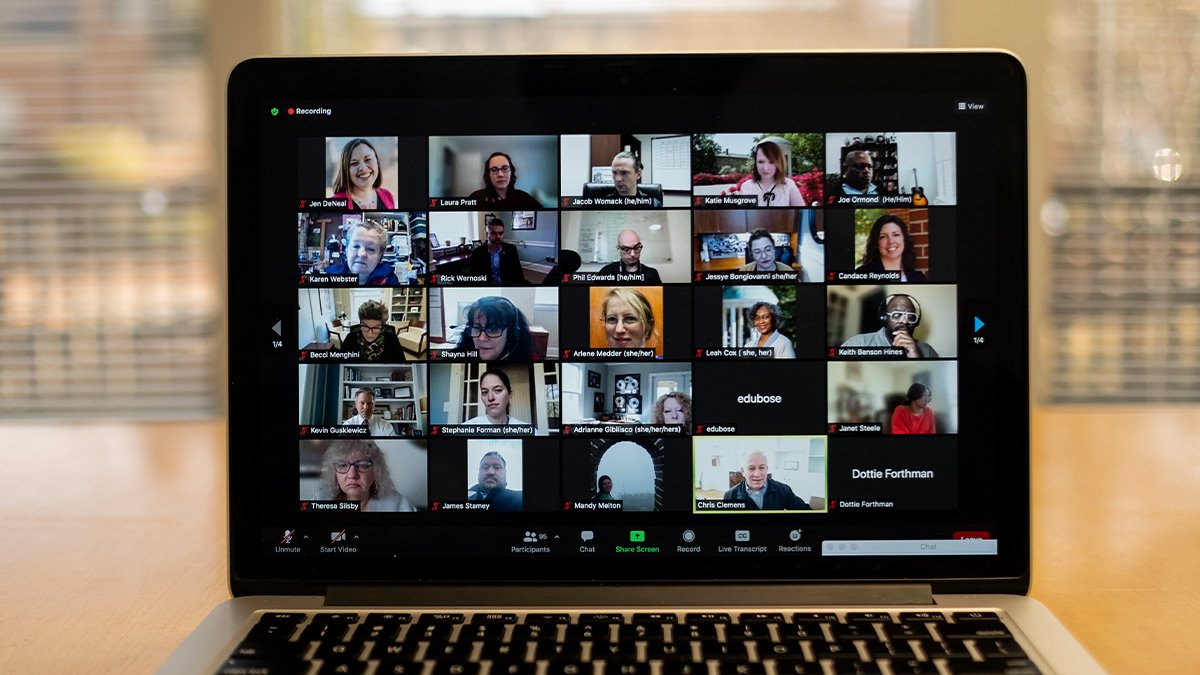Employee Forum: Flexible work plan, merit pay increases, more
Delegates and campus leaders engaged in frank, meaningful dialogue at this month’s meeting.

How campus units will use the new Flexible Work Option Playbook to assign staff to remote, hybrid or on-campus work began the Employee Forum’s Feb. 2 meeting. Discussions followed about merit raises, internal promotion processes, diversity and inclusion efforts and mental health support plans.
And, on his second day as the new provost and chief academic officer, Chris Clemens rushed from teaching a class of 70 astronomy students to join the forum for down-to-earth conversation.
A new playbook
Candace Reynolds and Suzie Baker, transformation managers from Operational Excellence in the Office of the Provost, presented details on a new Flexible Work Option Playbook to guide units in implementing flexible work arrangements. For details, see The Well’s story about the new arrangements.
Diversity, equity and inclusion plans
Leah Cox, vice provost for equity and inclusion and chief diversity officer, gave an update on her office’s work that includes:
- Planning work on inner-group dialogue using a University of Michigan model that facilitates difficult conversations on identity.
- Working with Lynn Williford, assistant provost for institutional research and assessment, on an institutional climate survey.
- Partnering with Hillel International on a survey regarding Carolina’s Jewish students and campus culture.
- Directing a DEI Council review of University policies.
- Revising a calendar of holy days and observances.
- Setting up more DEI training and resources for campus units.
A new provost, frank conversation
Clemens joined the meeting minutes after teaching 70 students in Astronomy 205. He said he would focus as provost on being chief academic officer, including nominating faculty for awards and nurturing junior faculty. He then quickly engaged delegates by saying he wanted to hear about issues affecting staff, “because, of course, we rely entirely upon staff to operate the University. Your matters are academic matters in that sense. You’ll be seeing some initiatives around faculty initially, but I certainly want to pay attention to all of your concerns.”
Clemens, along with Chancellor Kevin M. Guskiewicz and Vice Chancellor for Human Resources and Equal Opportunity and Compliance Becci Menghini, answered several questions.
Forum delegate Stephanie Forman, executive and special projects assistant in the Gillings School of Global Public Health, asked leaders about plans for retaining employees.
Guskiewicz said that he often points to Carolina’s strategic plan, which includes an initiative on career development. “This isn’t just about career development of our students, but this is about the career development of our faculty and our staff. We have to look at opportunities for upward mobility for our faculty and our staff who are often tapped to go to other universities or other industries,” he said.
The chancellor has talked with leadership at the UNC System office about how to eliminate barriers, with internal promotions as a possibility. The University has also developed a reinvestment fund, Guskiewicz said, that will allow it to be strategic in supporting salary increases for staff and units around campus.
Menghini said that under the University’s authority to grant discretionary increases “we are trying to identify some central funds. Units are also being asked to contribute. Units have been asked to make recommendations as part of their budget process, and those payments, should they be approved, will happen in March.”

Employee Forum delegates and guests talk during a virtual meeting on Feb. 2, 2022. (Jon Gardiner/UNC-Chapel Hill)
Clemens shifted the focus to employee input. “I’m fond of saying that the entire University depends on the goodwill of our staff because we sure aren’t paying them enough to get the amount of work that we see coming out of them,” he said. “The pandemic strained us in so many ways and may have even strained goodwill a bit on the part of our employees, including faculty, but certainly staff.”
He asked delegates, “What would help rebuild the goodwill? Kevin has addressed the budget and the ability to invest in advancement for staff internally and to build career opportunities, but what do you think? What should I be doing? What should I be seeing with respect to staff that I need to know?”
Forman responded: “I want to thank you for acknowledging that maybe the goodwill has been strained a little bit. I think it was two years ago, Keith [Hines], in an executive committee meeting said that our buckets are empty and we’re running on empty. That was two years ago. That really resonated with people, and that was a long time ago. People have taken on a lot of responsibility for folks who have left.”
Addressing employee mental health
Vice Chancellor for Student Affairs Amy Johnson responded to a question about the University’s mental health initiatives since November’s Mental Health Summit. Johnson mentioned items that she described in the forum’s December meeting, including:
- Upcoming seminars and a mental health colloquium in May.
- The launch of the Heels Care Network and an associated mental health hub website.
- Carolina partnering with the Jed Foundation, which provides expertise, resources and tools for protecting the emotional health of and preventing suicide among teens and young adults.
To help lessen the stresses of work and life for employees, Menghini said that in addition to resources such as the Employee Assistance Program, that the University is trying to hire more people, more quickly to alleviate workloads and that discretionary money exists. She said that filling vacant positions could help employees feel like they can take leave time that they earn, and help their well-being.
Menghini also said that the University plans to “leverage the mental health days for students into a no-meeting day for staff as an opportunity to catch up, catch their breath, build their mental well-being and continue in their work.”
Other topics
- The University has engaged a consultant to look at affordable housing in Chapel Hill, beginning with nearby and University-owned properties, to determine what could be done to create more affordable housing. “The University is the largest employer in Orange County, yet 60% of our employees are driving from outside the county to come to work,” Guskiewicz said.
- Jessica Pyjas, work/life and wellness program manager, recommended upcoming Wellness Wednesday Webinars, reducing stress by picking up a hobby through Be A Maker (BeAM) spaces and attending Employee Wellness Day March 18.




